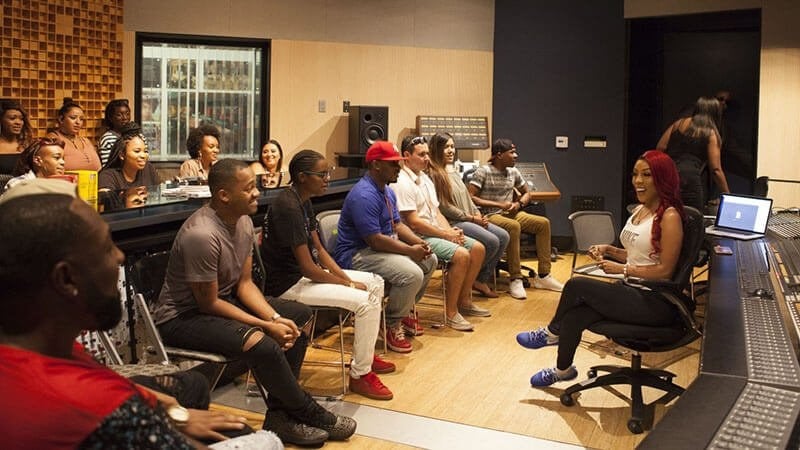Pro Advice
Personal Branding Pro Tips
Update: In November 2018, Full Sail’s Internet Marketing programs were updated and are now Digital Marketing Bachelor’s, Digital Marketing Master’s, and Digital Marketing Certificate.
Everybody talks about his or her “personal brand,” but just how important is it?
“As a marketer, personal branding matters so much,” says Rob Croll, owner of Marlannah Digital Marketing, which specializes in assisting small-to-medium sized businesses with their online strategies, as well as director of Full Sail University’s online Internet Marketing bachelor’s and master’s degree programs. “What you put out there on social media can live forever, and it needs to represent the kind of person – and professional – you want to be perceived as.”
Hiring managers want to see marketers capable of professionally promoting themselves online, and there’s a good chance their future manager is checking them out online during the hiring process. Below are a few tips from the pros on building a personal brand and online presence that will be noticed for the right reasons.
A LinkedIn profile is essential.
“LinkedIn is more than an online resumé,” says Croll. “Recruiters search for prospective employees on LinkedIn, but it’s also a good tool for connecting with other people in the industry and finding freelance work.” Croll’s advice: Include keywords related to specific professional experience that recruiters may be searching for and constantly keep updating relevant skills and experience. Students should include the names of the courses that they’re taking, so anybody browsing their profile can see what they’re capable of doing. Croll also suggests following leaders in the industry to see what kind of content they’re sharing. It’s a great way to brainstorm ideas for personal promotion.
However, just a LinkedIn profile isn’t enough. For a marketer in today’s digital world, a strong personal brand means demonstrating a command of multiple platforms.
Make sure to use the right platforms for self-promotion.
“It’s important that your social media aligns with your personal brand,” says Croll. “I don’t really like taking videos of myself, so I’m not going to spend time on Vine. But on Facebook, I can share articles that match my personality, and on Twitter, I can connect with people in my industry.” Periscope, Instagram, and Pinterest all offer opportunities to showcase different skills, and niche opportunities exist in platforms from Goodreads for avid readers to Instructables for DIYers.
Not every platform will be a good fit, so it’s important not to try to be everywhere. However, when managing multiple platforms, services such as Hootsuite, Buffer, or SocialOomph make it easy to schedule and manage posts from one dashboard, and many offer free individual accounts. Developing a personal website from one of the many user-friendly website building options and using it to connect to public social media profiles can be a great way to showcase a strong online persona.
Consider keeping professional and personal personas separate.
Everyone has a different approach, but it’s most common to keep professional and personal profiles separate, and an easy way to do this is to assign different social media platforms to different personal objectives. Genon Murray, a freelance product development consultant and writer with over twenty years of experience, keeps work and play separate: “I use LinkedIn for business and Facebook for friends,” she says. “I don’t really connect with business associates on Facebook, and I don’t really connect with friends on LinkedIn.”
The pervasiveness of social media increasingly makes it difficult to maintain full separation, and privacy is never guaranteed, even when maintaining separate connections. Don’t ever assume anything is truly private.
Be aware of the audience.
This includes future employers, freelance clients, and colleagues. “Professional and personal personas are melding together a lot more on social media, and I think a lot of younger people don’t really have any qualms about sharing everything with everyone,” says Croll. “But it’s still important to be aware of your audience. I don’t post anything overtly political, because my social audience includes not only friends, but my clients and my students too. Being conscious of what you’re saying on social media is important from a professional sense, but at the same time, can be a nuisance, because you have to constantly be thinking about what you’re saying.” Be sensible, avoid anything overly inflammatory or negative, and always be respectful.
Personal branding is an ongoing process.
Marketers and other professionals can’t just create an outstanding profile or personal website once and assume they have a great personal brand. “I teach my students to do a quick review of their online presence, looking at things like Klout score, and have them formulate a plan for moving forward in improving their online presence,” says Murray, who is also course director of the capstone course in Full Sail’s Internet Marketing master’s program. “Students can promote their personal brands the same way they promote a company.”
Make sure a personal brand has an actual personality.
Don’t turn a personal brand into a robot for professional speak. “On Twitter, I post things very much related to my business and marketing, but I also interject personal things as well because I think it’s important for people to know they’re dealing with a real person,” says Carol Cox, co-founder of a digital marketing agency and an Internet Marketing course director at Full Sail. “People want to interact with other people, not just a brand.” Being professional doesn’t mean not being genuine and natural. A company brand has a voice that’s authentic and true to its values, so should a personal brand.
Full Sail University’s Internet Marketing Master’s program equips students with the techniques that brands and businesses need in order to engage with consumers in the constantly-evolving digital world. To learn more, click here.
Whether you’re ready to apply or just want to learn more about Full Sail University, our Admissions Representatives are here to help. Call us or request more information.
Keep Exploring
- Alumni Updates
- Government
- Computer Science
- Audio Production
- Image Gallery
- Warped Tour
- Web Design & Development
- New Media Journalism
- Career Development
- Innovation & Entrepreneurship
- Computer Animation
- Real-World Experience
- Online
- Creative Writing
- Student Organizations
- Job Search
- Students & Faculty
- Film Production
- Student Life
- E-book
- Game Art

